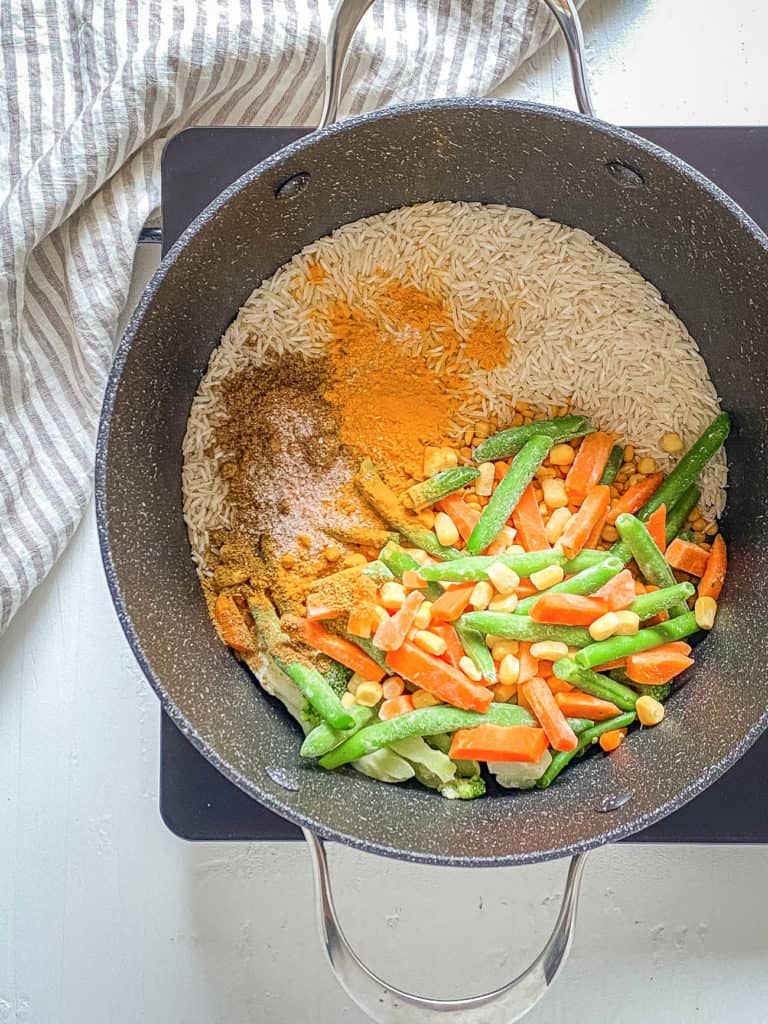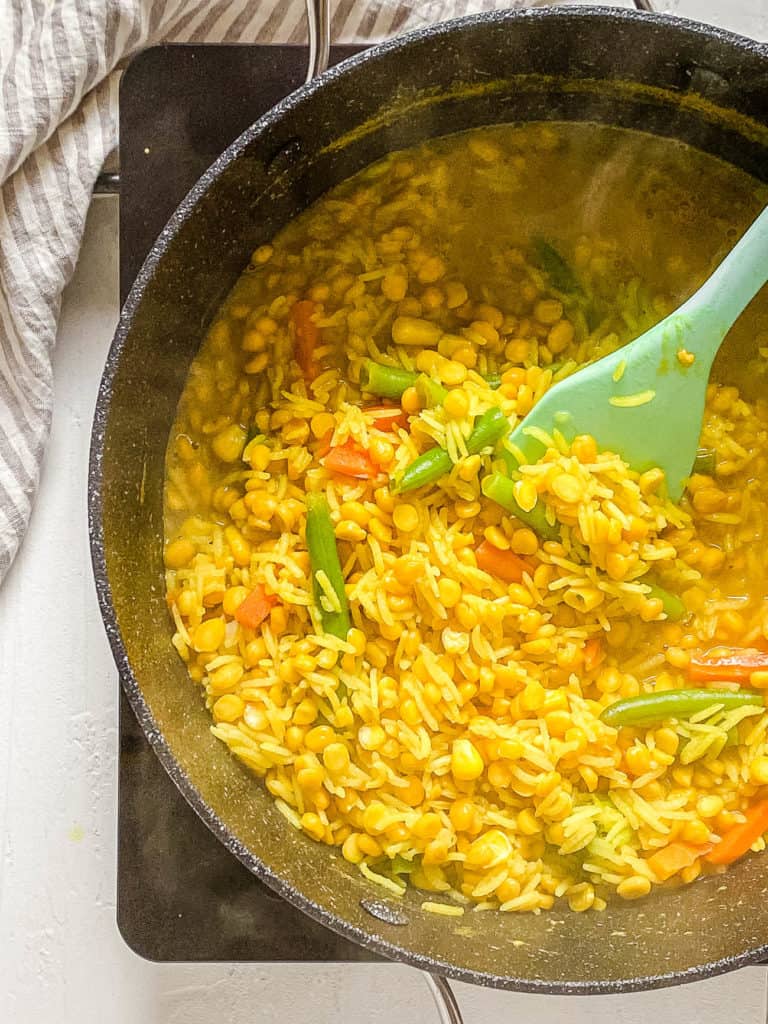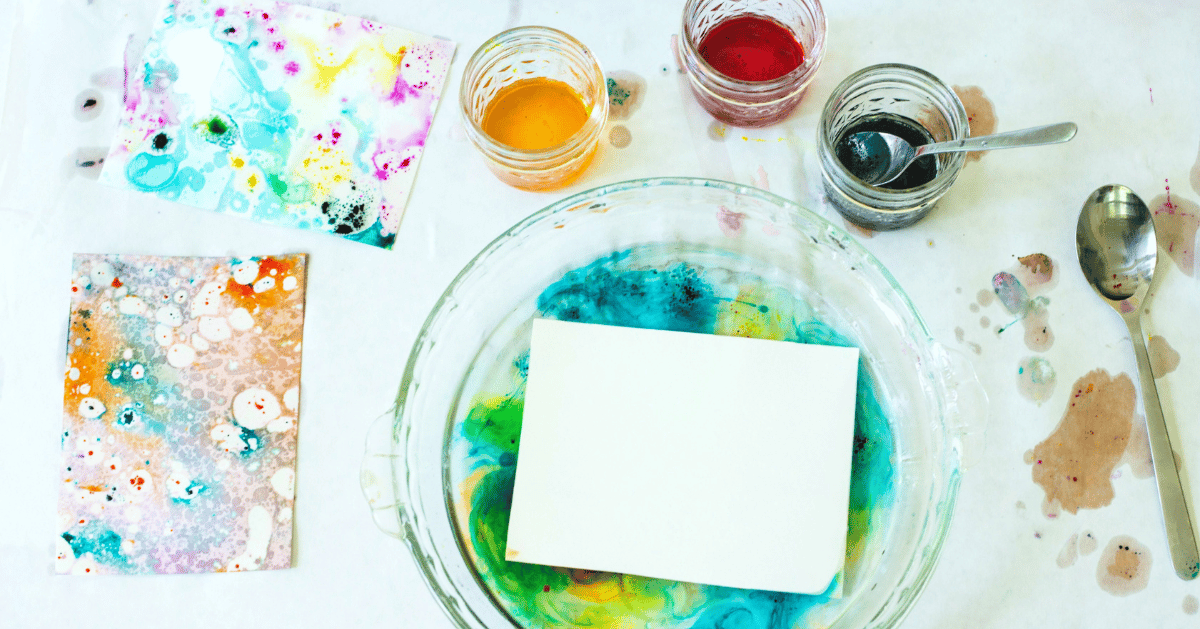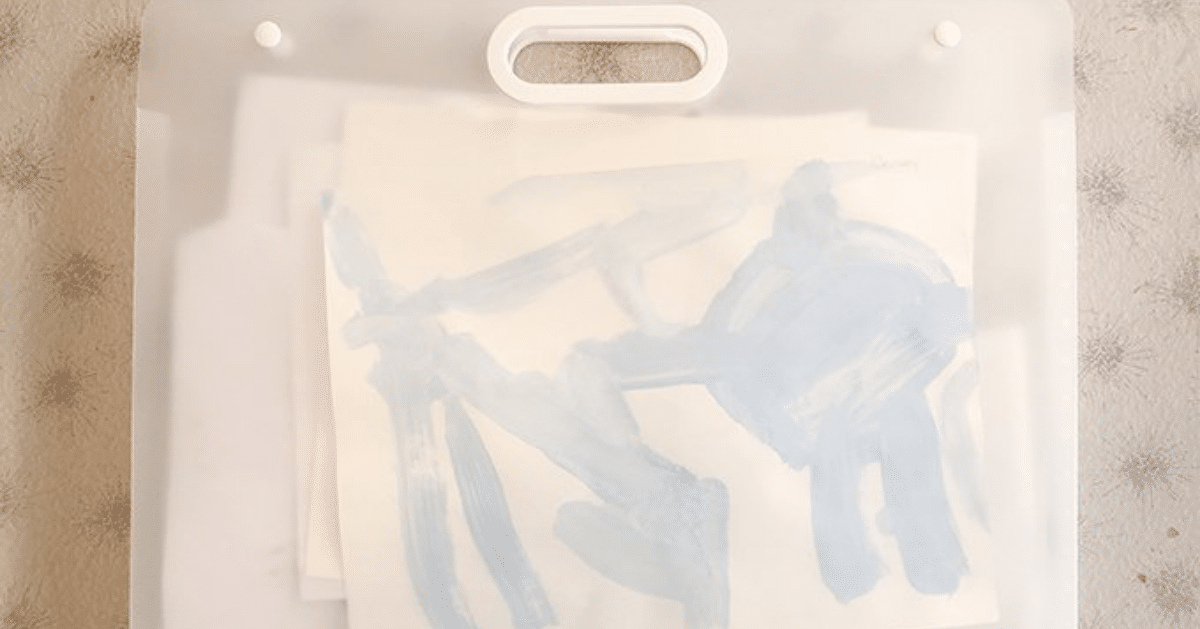
My lentils for baby is one of the easiest meals you can make for your little one. Combining lentils, rice, and veggies, this baby lentil recipe, known as “khichdi” in India, is a nutritious, one-pot meal. It’s healthy, flavorful, and easily adaptable to your baby’s age and dietary needs.
When it comes to making homemade baby food, simple vegetable or fruit purees are the most common recipes you’ll find. But my baby lentils are so much more than just a basic lentil baby puree and super easy to make.
This lentils baby food recipe combines simple ingredients with a touch of Indian spices to create a stew packed with protein and fiber. It’s a healthy and versatile recipe that, no matter how you make it, you’ll end up with a nutritious one-pot meal your little one will love. It was one of my kids’ favorite first recipes.
???? When Can Babies Eat Lentils?
Every baby is unique, but in most cases, you may introduce lentils to your baby as young as 6 months, making it an excellent first food. I introduced lentils to both of my kids right around 6.5 months of age, after they had already tasted a few different fruits and veggies.
Lentils are easy for babies to digest and can be prepared as a puree for younger babies, which is how I served it to my kids when they were babies. As your baby grows and becomes more comfortable with different textures, you can gradually introduce mashed lentils and eventually whole lentils.
???? Are Lentils Good For Babies?
Lentils are one of the healthiest foods to give your baby. They are an excellent source of protein, which is vital for building and repairing tissues, and high in fiber, promoting healthy digestion. Lentils are also rich in iron, zinc, B-vitamins, folate/folic acid, and magnesium (source).
Babies begin to lose their iron stores around 6 months of age (source), so starting to make lentils for baby 7 months old and as young as 6 months is a great way to boost their iron levels. Breast milk alone may not contain enough iron for babies older than 6 months (source). It’s recommended to pair lentils with foods rich in vitamin C for the best absorption (source).
It’s also important to note that while lentils (like all legumes) do contain antinutrients like phytic acid and lectins that can interfere with nutrient absorption (source), many other foods do too. The good news is, cooking the lentils helps reduce the antinutrients significantly, and soaking the lentils before cooking them will help reduce the antinutrients even further (source). So as long as the lentils are well-cooked, you don’t need to worry!
???? Do Lentils Cause Baby Gas or Constipation?
Yes, some types of lentils may cause gas in your baby when consumed in large quantities or with other gassy foods such as cruciferous vegetables like broccoli, cabbage, cauliflower, and Brussels sprouts (source). If your baby is prone to gas, consider adding vegetables such as carrots, green beans, or spinach instead. Both of my kids were prone to gas, so I always served them lentils alongside less gas-producing veggies (like spinach and carrots as I mentioned).
Lentils should not cause constipation in babies if they are introduced at 6 months of age or later. Be sure to give your baby a good amount of water during the day to balance out any high-fiber foods they’re eating to prevent constipation. I always served my kids a sippy cup of water whenever I gave them solids.
My lentil recipe for baby is a fantastic plant-based source of protein, vitamins, and minerals. It’s a gluten free one-pot healthy meal that is easy for babies to digest. You can feel good about feeding it to your little one.
Plus, you can make my easy lentil baby food in a crock pot, a pressure cooker, or let it simmer on the stove for hours.
There’s very little prep work and a lot of downtime with this recipe, which allowed me to get it cooking and then spend more time with my family (versus spending time stirring or watching the lentils on the stovetop).
Another thing I love about this lentil recipe for babies is that it can actually be served to older children and adults as well. Just increase the spices and don’t puree the stew.
I would often do this – I’d make a family-sized portion, I’d puree the version for my baby, and then my husband and I would increase the spices and eat the non-pureed version ourselves – it worked out great!
This is a baby food recipe I would make in bulk and freeze in ice cube trays, or store in the fridge for up to 5 days. This way, I always had a nutritious meal ready to go!
Latest Recipe Video!
???? Ingredients
You only need a few basic ingredients to make my lentil baby recipe, and you can find them all at your local grocery store. For the exact amounts and nutritional information, scroll down to the recipe card at the bottom of the post.

Yellow Or Red Lentils: I always use yellow or red lentils for baby food because they cook more quickly and have a softer texture. However, you can use any type of dried lentils you prefer (green lentils or brown lentils would also be fine); just keep in mind that the cooking time may vary.
White Basmati Rice: You can also use brown rice; however, white basmati rice breaks down more easily and is easier for baby to digest.
Mixed Veggies: I like to use a mix of frozen carrots, peas, and broccoli, adding about ½ a cup of each. However, you can also use sweet potatoes, cauliflower, butternut squash, or any other veggies you have on hand. Feel free to use any frozen or fresh vegetables you like.
Spices: My baby lentil recipe uses common spices from Indian cuisine like garam masala, cumin, coriander, and turmeric. For an additional layer of flavor, you can also add a pinch of mild curry powder.
???? How To Make Lentils For Baby
Learning how to prepare lentils for baby is a super simple 3 step process that anyone can master. Once everything is in the pot, your work is basically done!
Watch my video below to see how easily my lentils recipe for baby comes together.
Combine The Ingredients: First, I put the water, lentils, rice or quinoa, veggies, and spices into a large pot on the stove. Then I bring everything to a boil and turn the heat down to a simmer over low to medium heat.

Cook: Once the stew begins cooking, I let it simmer on low for 1-3 hours, stirring occasionally. You can also put all ingredients into a crock pot and cook on high for 4-6 hours.

Mash And Serve: When done, I mash the stew with a potato masher or I puree it with an immersion blender. If serving right away, I let the lentils cool a bit and serve them at room temperature.
Freeze And Store: If I’m making my baby lentil recipe for meal prep, after it cools I store it in the fridge for up to 5 days or I portion it out into ice cube trays and freeze it.

My #1 Secret Tip when learning how to cook lentils for baby is not to rush the cooking process. Allow the lentils and vegetables enough time to cook down until soft and mushy. This will take several hours on the stovetop, or in the crockpot.
Properly cooked lentils are crucial for nutrient absorption and to avoid any digestive discomfort. This also helps make it super easy to either blend or mash the lentils when you’re serving it to your baby.
Other Tips To Keep In Mind:
- Blend Or Mash: Depending on your baby’s age and chewing ability, you can use a potato masher or place the lentils in a food processor or blender and blend until smooth. It should have the consistency of a hearty soup or stew.
- Customize The Spices: Feel free to adjust the spices to suit your little one. Just remember to avoid adding salt or sugar.
- Introduce Slowly: When introducing lentils baby food to your baby’s diet for the first time, start with small amounts to ensure they tolerate it well and watch for any signs of allergies or digestive discomfort.
- Pair With Vitamin C: To enhance iron absorption, pair my lentil baby food recipe with foods rich in vitamin C, like pureed sweet potatoes or carrots. Sometimes I would blend those foods right into the lentil mixture to save myself a step!
???? Variations
Exploring different lentil baby food combinations is a great way to add variety and extra nutrients to your baby’s diet. You can easily take my lentils baby food recipe and create delicious variations that will keep your little one excited about eating. Here are some of my favorites:
Use Different Vegetables: I love using carrots, peas, and broccoli, but you can use any of your fresh or favorite frozen vegetables when making my baby lentil puree. Just be sure that they cook down enough.
Leave Out the Spices: If your baby is not yet used to spices, you can leave them out, or alter the spices to suit your baby’s preferences. When I first started serving this to my kids, I’d use only cumin and turmeric, and then add in the rest of the spices in small amounts each additional time I made it.
Add Breast Milk or Formula: When preparing lentils for baby, you can stir in some breast milk or organic baby formula. However, I do not recommend adding in breast milk or formula before freezing, as this can affect the texture and nutritional quality. Instead, mix it in just before serving.
Add Healthy Fats: Serve my baby lentil stew with a drizzle of olive oil, organic whole milk, plain yogurt, full fat coconut milk, ghee, or melted coconut oil on top!
???? Serving Suggestions
Deciding how to serve lentils to baby is just the beginning. While my recipe was designed as a baby food, it’s much more than a simple lentil puree for baby! You can also serve it to toddlers, older kids, and adults, making it a versatile meal for the whole family.
Young Babies: You can first start preparing lentils for baby 6 months and up. At this age, I suggest blending the stew into a smooth puree. You can also combine some of the lentils baby food with fruit purees like apple or pear puree, which can be more appealing to some babies.
Older Babies: For slightly older babies who are ready for more texture, use the potato masher to create a chunkier mash. I did this when my kids were about 10 months old.
Toddlers: When making lentils for toddlers you’ve got options. You can add more water or low-sodium veggie broth and turn my baby lentil recipe into a soup. At this age, you can also add more spices and veggies if you like.
Older Kids and Adults: For family meals, you can leave it chunky, spice it up, and serve it with yogurt and a side of this vegan naan. I also will add chopped cilantro and diced onions as a topping!
Baby Led Weaning
Baby-led weaning (BLW) is a fun and engaging way to introduce your baby to solid foods by encouraging them to self-feed right from the start, usually around six months old. This method helps develop fine motor skills, promotes independence, and makes mealtime more enjoyable for both you and your little one.
Here are some baby led weaning ideas for my baby lentil recipe:
Lentil Patties: Cook the lentil stew until it thickens, then add some breadcrumbs and form small patties or fritters. Fry them lightly in a pan or bake them in the oven until they hold together. These patties are easy for babies to grasp and self-feed.
Lentil Fingers: Add some more cooked rice to the thickened lentil stew and shape it into finger-like sticks. Chill them in the fridge so they hold together, and then pan fry them so they become a little more firm, making them perfect for little hands to hold.
Lentil Dip: Blend the lentil stew to a smooth consistency and use it as a dip for soft vegetable sticks like steamed carrots, zucchini, or cucumber. This can introduce your baby to a variety of textures while still getting the nutrients from the lentils.
???? Storage Directions
Fridge: Once completely cool, I would store my lentils baby food in an airtight container in the fridge for up to 5 days. When ready, I’d either let it come to room temperature before serving, or I’d warm it gently in the microwave, give it a good stir, and test it to ensure it’s not too hot before serving.
Freezer: For longer storage, pour the puree into ice cube trays. I like to use the Mumi & Bubi Trays for storing. Then cover the trays with an airtight lid and place them in the freezer for up to 3 months. When ready to serve your baby, place a small cube in an airtight container in the refrigerator overnight to defrost, then warm on the stove or the microwave until it’s reached your desired temperature.
❓Recipe FAQs
Lentils come in a variety of types and colors, each with its own unique flavor, texture, and nutrient profile. When making lentils baby food, I find red lentils and yellow lentils to be the best.
They cook quickly, have a softer texture, and are easier for baby to eat. They also produce less gas, which is a big plus.
On the other hand, you can also make brown lentils or green lentils for baby but the cooking time will take longer. They hold their shape more, so you’ll need to mash them quite a bit to make them baby-friendly.
Generally, you do not need to soak lentils before cooking them. Red and yellow lentils, in particular, cook quickly and do not require soaking. However, soaking other types of lentils can reduce cooking time and help make them easier to digest by breaking down some of the complex sugars that can cause gas.
If undercooked, I would just add more water or broth and continue cooking until the lentils reach the desired tenderness. Keep the heat at a simmer and check frequently, adding liquid as needed. It’s important to make sure you fully cook lentils for babies.
To prevent lentils from sticking to the pot, I make sure to use enough water or broth during cooking. I’ll also stir the lentils occasionally to ensure even cooking and prevent them from settling at the bottom. Cooking lentils on a low to medium heat can also help prevent sticking.
If your lentils are watery, it might be because you added too much liquid or didn’t cook them long enough for the excess liquid to evaporate. To fix this, you can continue simmering the lentils uncovered to allow the liquid to reduce. Alternatively, you can drain any excess liquid using a fine-mesh strainer.

Want to Save This Recipe?
Enter your email & I’ll send it to your inbox. Plus, get great new recipes from me every week!
By submitting this form, you consent to receive emails from .
Love this baby food recipe? Please leave a 5-star rating ???? in the recipe below and/or a review in the comment section further down the page!
You can also FOLLOW ME on FACEBOOK, INSTAGRAM, and PINTEREST to see more delicious, healthy, family-friendly food, and if you have any questions, I’m here to help!
???? Recipe Card
Easy Lentils For Baby
My lentils for baby is one of the easiest meals you can make for your little one. Combining lentils, rice, and veggies, this baby lentil recipe, known as “khichdi” in India, is a nutritious, one-pot meal. It’s healthy, flavorful, and easily adaptable to your baby’s age and dietary needs.
Servings: 16 cups
Calories: 33.8kcal
Shop Ingredients on Jupiter- Allow the lentils and vegetables enough time to cook down until soft and mushy. This will take several hours on the stovetop, or in the crockpot.
- Use a potato masher to puree the stew. Alternatively, you can place the lentils in a food processor or blender and blend until smooth. It should have the consistency of a hearty soup or stew.
- Feel free to adjust the spices and consistency based on the age of your baby!
- This recipe makes 16 cups of food, which equals 256 tablespoons of food. Assuming your baby is eating about 4oz of food in each meal, this will make 64 meals for your little one!
Serving: 4tbsp | Calories: 33.8kcal | Carbohydrates: 6.3g | Protein: 2g | Sodium: 7mg | Potassium: 30mg | Fiber: 2.3g
Originally published in pickyeaterblog.com






